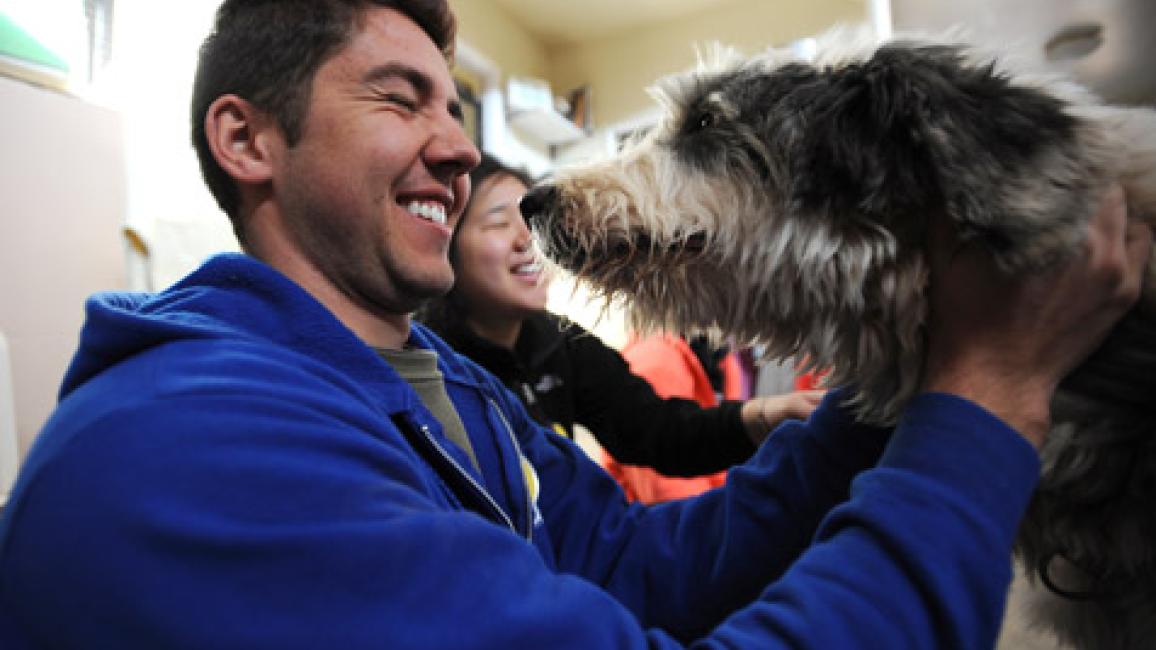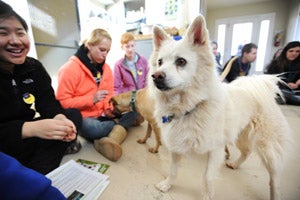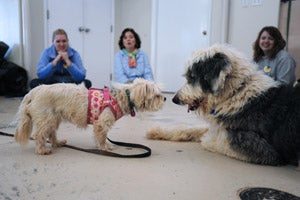Puppy mill socialization class

Most folks who volunteer at an animal rescue or sanctuary like Best Friends Animal Sanctuary already know about puppy mills — or at the very least have an idea about them. Even so, after attending the new Best Friends puppy mill socialization class, many people walk away with an even greater understanding. "Almost everyone learns something new about puppy mills," explains Best Friends dog trainer Tamara Dormer.
Puppy mill socialization class

Lancer
The puppy mill socialization class is set up differently from other training classes offered at the Sanctuary. In shy dog class, for example, each dog typically has his or her own handler, who provides one-on-one attention. Not so with the puppy mill socialization class, where such close proximity could be more than the dogs are ready to deal with. Here, the dogs roam the room dragging their leash behind them, while human attendees sit on the floor so they appear less threatening.
A positive experience for the dogs
During the class, people take turns tossing small treats to the dogs whenever they pass by. The point is to make the experience as positive as possible for the dogs. Though the weekly class has only been running a little over a month, several dogs are already showing progress.
Miss Molly, a gorgeous but bashful American Eskimo dog, has grown more accepting of human attention in general. "She’s gotten much easier to leash up," explains caregiver Tom Williams. He also points out that Miss Molly is more social with volunteers since class began, whether when going on walks with volunteers or simply spending time with them in the building.

Pout and Bentley
Pout, a shy little Havanese, has also made strides. She still isn’t ready to be petted, but the class is helping her take those first tentative steps toward trusting. "She likes food enough that she’ll definitely come up and get the food," Tamara says, "but she won’t offer to be touched." And yet, in a recent class, Pout stood bravely in the middle of the circle of attendees, accepting treats from people on all sides. She’s starting to figure things out.
Licensed dogs with papers from puppy mills
Even with all the good the class is doing for the dogs, Tamara explains that the biggest impact is probably the education visitors take away.
One detail that often comes as a surprise is that puppy mill dogs are usually licensed, papers and all, with the American Kennel Club (AKC). "A lot of people are under the impression that if they go to a store and the dog has papers, that the dog didn’t come from a puppy mill," Tamara says. She urges people to find out for sure what a dog’s background is as having the papers is never a guarantee. Even better, she suggests, don’t buy from a pet store or breeder at all. But rather, adopt instead.
"I tell people you need to write the (pet store) manager and explain why you’re not going to shop there," explains Tamara. "A lot of this class is educating people on how to make a difference."
When it comes to puppy mills, there are plenty of awful things to shake your fist at. "Some (puppy mill) dogs have never touched earth," Tamara explains in her classes. "For us, it would be like spending our whole life in a compact car."
Attendees walk away better armed with knowledge about how to fight puppy mills. That’s 30 minutes well spent indeed, even for someone who thought they already knew all there was to know about puppy mills.
Best Friends’ puppy mill initiatives
Right now, millions of adult dogs are suffering on the "production line" in America's puppy mills. Their sole purpose is to breed and make money for their owners. They live in tiny, wire-bottomed cages, in squalid conditions, with little human contact and often no veterinary care. Find out about Best Friends’ puppy mill initiatives, which are part of our mission to bring about a world of No More homeless pets.
Photos by Molly Wald